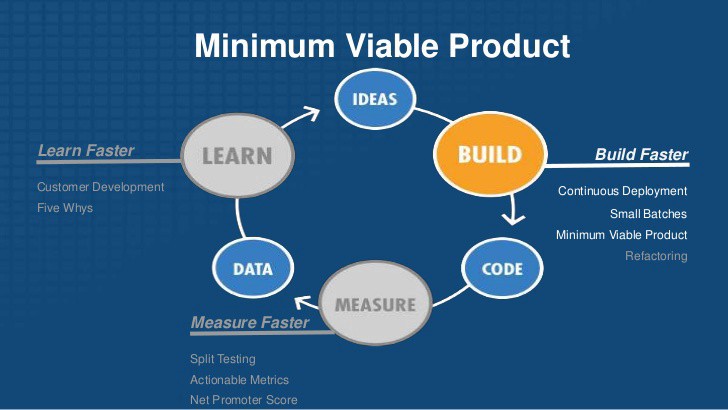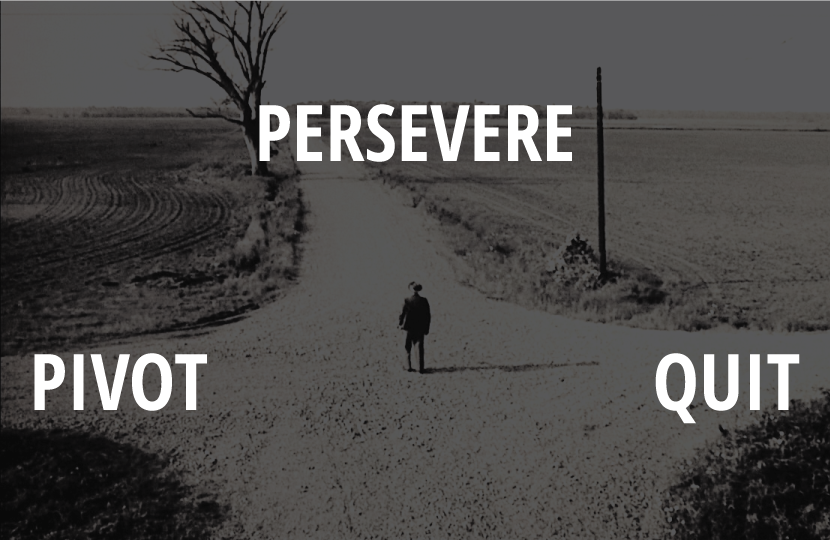Validated Learning, A new paradigm to measure Progress!
During my short career, I have seen people working tirelessly to come up with excellent business plans, somehow successfully executing those plans only to find out that they were running in the wrong direction and nobody wanted the end product in the first place forcing them to go right of the cliff. In most startups, almost all the discussion is about the timely and on-budget execution of the plan with a little or no focus on the end users and their real needs. Eric Reis author of the Lean Startup defines this phenomenon as “being really good at executing failure plans”. traditional Indexes and benchmarks like product and business milestones do not properly sync with the startup world. The Soul purpose of a startup is to discover if the direction taken will lead to a successful sustainable business. Eric introduced a new type of milestone to measure progress called validated learning.
What is Validated Learning?
It’s a decision-making process based on scientific approach, each new feature, marketing campaign, plan etc is assigned an assumption or hypothesis. The accuracy of the assumption is tested based on the feedback from real users. using the validation approach direction changes and improvements are decided. the whole process of validation is much faster and accurate than the legacy approach of market forecasting and product planning. In the context of Startups, the concept of validated learning focusses on building an MVP and use specially designed metrics to validate the results instead of blindly following the business plans.
Based on the real data collected decision to pivot or quite is taken.
How to Drive Validated Learning in your Organisation?
As discussed the whole concept is to validate the whole idea with minimal efforts before building a huge product that nobody wants. In simple words, there are 4 basic steps to applying validated learning to your idea.
- Defining a hypothesis.
- defining a validation metrics to test the results.
- Building an MVP or experiment.
- Experimenting for a short phase ending with a conclusion.

Hypothesis Creation
The process starts with Hypothesis definition, we are used to this process of defining goals, we just need to change the process to be defined more carefully and managed properly. Management here means prioritized properly as not all goals are essential for the product and few are urgently required and some are required in the long run. The goal setting process now needs to follow a pattern of categorizing items according to urgency and priority based on their impact.
Coming Up With the Validation Metrics
Each experiment that we set up has a reasoning behind it, as we want our product to be a step closer to our vision with every hypothesis test. The metrics need to have simple yet concrete statements defining the accuracy of the hypothesis, an example can be ‘A 10 % growth in customers using the payment service in the region of South America’. poorly designed experiments may take forever to complete therefore it is essential to define a completion time as a checkpoint in the metrics too.
Setting Up the Experiment and the Validation Process.
To develop the experiment Most people adopt 5D framework approach 1) define, 2) design, 3) develop, 4) deliver 5) datafy validation. push Experiment or new features to the market, let them run for a few weeks and ‘datafy’ your validation. Based on the data the hypothesis can be set to True or False, but the summary includes learnings from product to customer and technology. usually, completion of one experiment does not mean an end to the whole process, quite often the results from one experiment act as a starting point for the second experiment.
Why Follow validated learning approach?
- helps shorten the development process by avoiding the development of unwanted features and time wastage on never finishing market research.
- shorter development means the budget required is sufficiently lower too.
- As the focus is on empirical data the process yields a customer-oriented product.
- promotes flexibility in the organisation as the approach supports agility and focus is on building an MVP and an individual hypothesis.
The sooner a startup validates its assumption the sooner they will be able to confirm their direction. In the process, any work done beyond the bare minimum needed to validate assumptions is a waste. The whole process will produce empirical data to result in better-informed decisions, problem-solution fit and eventually lead towards product-market fit and a successful and sustainable product.
Original article published here
Image is reproduced from Alex Changes Blog on Medium.com
How to Use AI-Powered SEO Tools for WordPress eCommerce
SEO is a critical factor in the success of any e-commerce WordPress store. As competition…
0 Comments11 Minutes
Why Short-Form Videos Are the Future of Content Marketing
Your Instagram customers spend over 50% of their time watching short-form videos and reels. Rather…
0 Comments12 Minutes
The Role of Digital Marketing in Business Growth
Online marketing touches every aspect of a business, whether it is initiating the idea or for an…
0 Comments3 Minutes
AI Meets Authenticity: Balancing Automation and Human Touch in Content Marketing
Is your brand starting to sound like a robot? In a world where algorithms write faster than any…
0 Comments8 Minutes
Essential Tools for Enhancing Web Design and UX Hosting
Have you ever visited a website that felt slow, clunky, or confusing? A website that is poorly…
0 Comments11 Minutes
How a Mini Cart Transformed My Store’s Shopping Experience
Okay, real talk—running an online store is hard. You think you’ve got everything figured out, you…
0 Comments9 Minutes
Balancing Your Security Initiatives With Industry Compliance Requirements
Managing a business today comes with a number of daily battles that need to be fought. Resources…
0 Comments11 Minutes
Best plugins to enhance the customer shopping experience
Customer experience is a key part of every online store. A good experience helps customers find…
0 Comments7 Minutes








